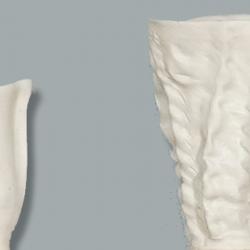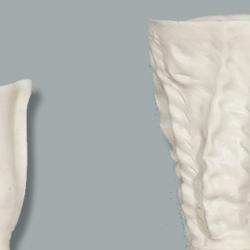Rudolf Staffel
San Antonio, TX
Rudolf Staffel
https://www.rudolfstaffel.com/
The breakthrough in Rudolf Staffel's art came in the 1950s, when he was invited to produce a set of dinnerware in porcelain. Up until that point, Staffel had felt that porcelain was alien to the craft tradition. He experimented with slip decorating and, fascinated by the translucency of the material, began to work toward a combination of form and material that would actually transmit light.
Staffel worked with highly volatile, porcelaneous clay bodies and enjoyed the considerable risk element inherent in the medium. This is apparent from his comment: "The best body that I have ever worked with is the body that I know nothing about or very little about" (Winokur and Winokur, 1977).
Staffel related his work to the push-pull of Hans Hofmann’s mode of expression, emphasizing that one is not aware of the push until one sees the pull. Working on this basis, Staffel builds and throws his vessels -- known as "light gatherers" -- in order to create different intensities of opacity in his forms. Staffel is fond of incising the porcelain to reveal the light through the thin layer of clay. In other vessels, he builds his forms out of a number of small clay slabs of different thinnesses and colors.
The 1970s saw the most fertile growth of this unique expression in the medium, establishing Rudolf Staffel as one of the most original vessel makers in American ceramics.
- Garth Clark, American Ceramics: 1876 to the Present, 1987 (p. 300)
Fast Facts
Name: Rudolf Staffel
Website: www.rudolfstaffel.com
Place of Birth: San Antonio, Texas
Education:
School of the Art Institute of Chicago
Significant or special training:
Pottery apprenticeship in Mexico
A lifetime of investigation into the translucency of porcelain
Notable or memorable instructors or mentors:
Hans Hofmann, José Arpa, Paul Cox
Particular field of study or class work:
Painting and Ceramics
Major influences:
Chinese historical porcelain, Asian art, Buddhist philosophy
Favorite materials or media:
Translucent porcelain
Gallery Representation (when Convention Center acquired artwork):
Helen Drutt Gallery (Philadelphia)
Stay in Touch
Sign up to receive news about the PCC Art Collection at the Pennsylvania Convention Center.



